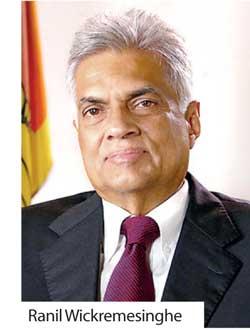Reply To:
Name - Reply Comment
President Ranil Wickremesinghe, in his capacity as the Finance Minister, recently announced a string of policy measures to defeat stagflation, which could become difficult to be undone if it became more deep-rooted. Sri Lanka’s economy collapsed in March, firing inflation just shy of 70 percent. This caused widespread shortages of essential commodities, including food and loss of jobs, which triggered a massive livability crisis, prompting hundreds of thousands to leave the country en masse to escape the misery back home.
 While the policies adopted in the last few months have managed to bring some semblance of stability to the economy, mainly by ending the days-long queues for fuel and gas, Wickremesinghe in his address to Parliament last week appeared unsettled. This was largely due to the prolonged absence of growth in the economy amid the soaring prices, as people could lose patience any moment in the lack of economic opportunities and ease in the cost of living.
While the policies adopted in the last few months have managed to bring some semblance of stability to the economy, mainly by ending the days-long queues for fuel and gas, Wickremesinghe in his address to Parliament last week appeared unsettled. This was largely due to the prolonged absence of growth in the economy amid the soaring prices, as people could lose patience any moment in the lack of economic opportunities and ease in the cost of living.
“On the one hand, the economy is shrinking while on the other hand, inflation is rising,” he said in a special statement on the state of the economy on Thursday.
Wickremesinghe met with several finance ministers last week on the sidelines of the Asian Development Bank meetings to make the case for Sri Lanka trapped in unsustainable debt.
He unveiled a host of measures, starting from bringing back maximum retail prices on selected essential consumer goods, to identify and remove the obstacles that hinder domestic production and productivity to relaxing certain controls to attract and accelerate foreign inflows to controlling non-essential imports to preserve foreign currency to enforcing a healthy open market economy.
While the markets do not typically welcome the reimposition of price caps, which time and again proved to be a failure causing worst outcomes such as shortages, what took notice by many in the financial markets was the proposal to impose deposit rate caps to contain the interest rates at an acceptable level, hoping to revive growth.
“To contain the money supply, the Central Bank decided to raise interest rates. From the looks of it, although it appears that it brings benefits to certain individuals, as a whole it is unfavourable to the economy,” Wickremesinghe said.
“As a result, the economic growth will slow and domestic credit becomes restrained. The result is the economy contracts and the private sector retreats,” he added.
However, the Central Bank, which has the sole power over the direction of interest rates, on the same day Wickremesinghe spoke in Parliament, refused to give any indication for such a move to change course on its interest rate policy. The monetary watchdog last week maintained its ultra-tight monetary policy at current levels, with a singular focus on taming inflation, which is eroding nearly 70 percent of the value of the money in people’s hands.